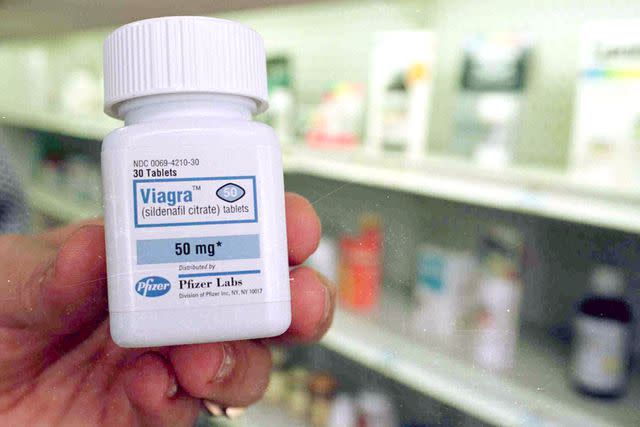Viagra May Reduce Alzheimer's Risk by Nearly 20%
Men who took erectile dysfunction drugs were less likely to develop the progressive dementia, a new report says

Getty
Viagra may reduce risk of developing Alzheimer's disease.Taking erectile dysfunction medication like Viagra may reduce the risk of developing Alzheimer’s disease by nearly 20%.
A new report in the journal Neurology looked at the health outcomes of 269,725 men who were diagnosed with erectile dysfunction, which the Mayo Clinic explains is the inability to get, or keep, an erection firm enough for sex.
The men who were prescribed medication — like Viagra — for their erectile dysfunction were 18% less likely to develop the progressive dementia, the BBC explained in its analysis of the study.
“We found evidence that the initiation of PDE5I was associated with a decreased risk of AD compared with nonusers,” the study’s authors wrote. PDE5I stands for phosphodiesterase 5 inhibitor, Viagra’s class of drugs..
The ubiquitous blue pill was not originally created to treat erectile dysfunction; its active ingredient, sildenafil, was designed to treat high blood pressure, as CNN recounted in its history of the drug.

John Chapple/Getty
A bottle of Viagra.However, “The discovery of phosphodiesterase 5 inhibitors (PDE5 inhibitors) for causing the erection of the penis was accidental, noticed as a side effect while being administered to investigate their ability to treat hypertension and angina,” the National Library of Medicine explained.
But while the men who took drugs for erectile dysfunction also apparently are at amlower risk of developing Alzheimer’s disease, what’s not clear is why, promoting the report’s authors to suggest further research on the topic.
Related: Alzheimer's Disease 'Might Be Partially Caused' by Nose Picking
“This study warrants further investigation into the pathophysiologic action of PDE5I and neuroprotection,” the report said, adding that both men and women need to be included in future research.
"It could be that it exerts a therapeutic effect directly affecting neurons (if the drug is able to cross the blood brain barrier) and/or by increasing blood flow, but both these hypotheses need to be tested," Dr Francesco Tamagnini, neurophysiologist at the University of Reading, told the BBC.
The Mayo Clinic estimates that 6.5 million people in the United States age 65 and older have Alzheimer's disease, with more than 70% of those patients being 75 years old and older. The progressive brain disorder is the most common form of dementia.
Never miss a story — sign up for PEOPLE's free daily newsletter to stay up-to-date on the best of what PEOPLE has to offer, from celebrity news to compelling human interest stories.
Alzheimer's disease is estimated to be the cause of up to 70% of the 55 million people globally with dementia. The National Institute on Aging says its cause can be a "combination of age-related changes in the brain, along with genetic, environmental, and lifestyle factors."
And while there is no cure for the disease, a new medication, Leqembi, was approved last summer by the FDA that promises to help slow the progression of the disease — if taken while still in its milder, early stages.
Related: Alcoholism, Social Isolation and More Increase Risk of Early-Onset Dementia, Study Finds
“Alzheimer’s disease immeasurably incapacitates the lives of those who suffer from it,” said Billy Dunn, M.D., director of the Office of Neuroscience in the FDA’s Center for Drug Evaluation and Research, "and [it] has devastating effects on their loved ones."
And as lead author of the Neurology report, Dr Ruth Brauer, told the BBC about erectile dysfunction medication’s potential impact on Alzheimer’s development, "More research is needed to confirm these findings, learn more about the potential benefits and mechanisms of these drugs and look into the optimal dosage."
For more People news, make sure to sign up for our newsletter!
Read the original article on People.

